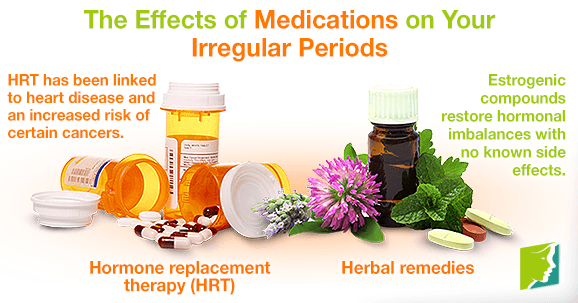Irregular periods are something most women will have to deal with at some point in their lives. From when menstruation begins in the early teenage years through to menopause around the early fifties, it is unlikely that your periods will occur perfectly in a regular, 28-day cycle. This is partially because the menstrual cycle is closely linked with your emotional and physical states, and these are ever-changing. In the perimenopausal years, women are particularly susceptible to heavy, irregular periods, and many consider turning to medication to help regulate them.
Hormones and Menstruation
Estrogen and progesterone are the hormones that essentially dictate the menstrual cycle. Estrogen causes the uterus wall lining to thicken prior to menstruation, and progesterone triggers the shedding of this lining (i.e., a period). As a woman approaches menopause, the imbalances of estrogen and progesterone levels in the body can cause periods to become irregular and heavy, which can be frustrating, not to mention uncomfortable.
Hormone Replacement Therapy (HRT)
Many women opt to treat their irregular periods - and a host of other menopausal symptoms - using hormone-replacement therapy (HRT). HRT is the oral, topical, or intravenous administration of estrogen into the body, which can have a regulating effect on the hormones that cause a number of menopausal symptoms. While effective, this form of treatment is not without its risks and side-effects; it has been linked to heart disease and certain cancers. For this reason, HRT should be considered only as a last resort after natural solutions have been tried.
Other Risks of HRT
Alongside the long-term health risks associated with HRT, opting for such a drastic treatment also creates the possibility of overlooking other possible causes of irregular periods. The menstrual cycle is sensitive to changes in the body and has a number of influencing factors that are not necessarily hormonal. Emotional strain or change can cause periods to occur less frequently. Grief, stress, moving, and periods of travel can all have such an effect.
Menstruation is also influenced by diet. Extreme weight loss or weight gain can cause periods to become irregular or even stop altogether. Lack of iron, found in red meat, fish, and seeds, and lack of phytoestrogens, found in soy products like soy milk and tofu, can also affect menstrual regularity.
Alternatives to Hormone-Regulating Medication
Menstruation is a natural bodily process and can often be treated naturally. Herbal remedies with concoctions of black cohosh, or dong quai have estrogenic functions to restore hormonal imbalances and help regulate menstruation over time with no major side-effects. Also, there are hormone-regulating supplements that balance your hormone levels and help prevent irregular periods.
The safest and most effective way of treating irregular periods is to identify what is causing them, and attempt to naturally remedy the problem. While estrogen replacement may seem like a quick fix to regulate your periods, it will not help if your periods are irregular due to lifestyle factors or other conditions. It's also relatively risky in the long run. Although irregular periods can be frustrating and inconvenient, try to get to the root of the problem and treat it with lifestyle adjustments and natural supplements before resorting to HRT.
Sources
- Better Health Channel. (2013). Menopause - hormone-replacement therapy. Retrieved 27th March 2014, from http://www.betterhealth.vic.gov.au/bhcv2/bhcarticles.nsf/pages/Menopause_hormone_replacement_therapy
- Better Health Channel. (2013). Menstruation: abnormal bleeding. Retrieved 27th March 2014, from http://www.betterhealth.vic.gov.au/bhcv2/bhcarticles.nsf/pages/Menstruation_abnormal_bleeding
- National Health Service UK. (2013). Periods, Irregular - Treatment. Retrieved from http://www.nhs.uk/Conditions/Periods-irregular/Pages/Treatment.aspx
- National Institutes of Health. (2014). Menstruation. Retrieved from http://www.nlm.nih.gov/medlineplus/menstruation.html
- National Institutes of Health. (2011). Vaginal bleeding. Retrieved from http://www.nlm.nih.gov/medlineplus/ency/article/007496.htm




